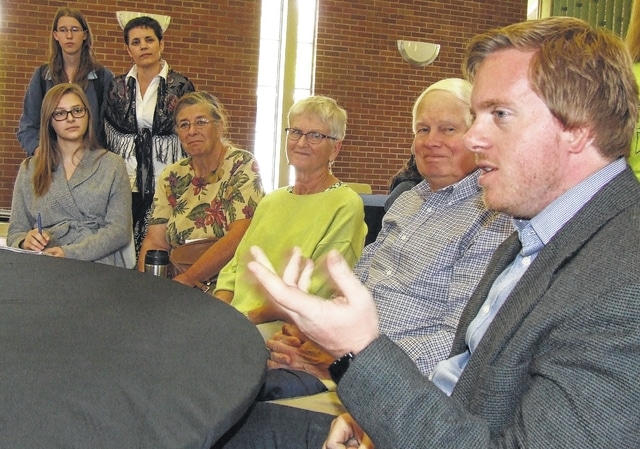
WILMINGTON — Public attendees who took part in a Peace Symposium roundtable in Wilmington were skeptical that Volkswagen is the only automaker to use emissions-cheating software.
The roundtable discussion, facilitated by Energize Clinton County (ECC) co-founders, was one of several held during Tuesday’s 25th annual Westheimer Peace Symposium at Wilmington College. The symposium’s theme was “Making Peace with the Environment.”
The same day of the roundtable comments about VW, the BBC News website posted an interview with a man who helped discover the emissions scandal. The report indicates John German “now thinks cars produced by other brands should be investigated for the emissions-cheating ‘defeat device’ software found in some VWs.”
The founders of Energize Clinton County, as the name suggests, wanted to spur local economic opportunities and put out a welcome mat to alternative energy employers for area residents hit by a jobless crisis due to DHL’s air park departure. Alternative or renewable energy often is viewed as more friendly to the environment and people than some traditional energy sources.
ECC co-founder Taylor Stuckert said Tuesday that when Mark Rembert and he started the nonprofit seven years ago, the state of Ohio had “aggressive” policies promoting renewable energy development.
One of the main reasons ECC shifted its focus to energy efficiency for local users rather than upon alternative energy production, Stuckert said, is because state policy subsequently “changed dramatically” on renewable energy production and installation.
At one point in the discussion, Rembert said it seems Ohio has turned its energy policy more toward natural gas than to renewables.
Natural gas is cleaner than some traditional energy sources, plus Ohio “is rich” in it, said Rembert.
At another juncture, Rembert said, “Energy is very political.”
Through deregulation of the energy sector, individuals can buy all renewable energy for their household, said Rembert, acknowledging it might be at a higher rate.
But now it’s an option, he said, whereas in the past, the only option was a region’s utility provider.
Returning to the topic of auto emissions, Peace Symposium attendee and Clintonville resident Suzanne Koebel said Columbus doesn’t have emissions control tests for cars. This summer, she said, an advisory was issued due to the poor air quality there.
She remarked about an inconsistency in the state, saying Youngstown does have emissions tests.
The symposium’s evening keynote speech was presented by climate activist Tim DeChristopher. He engaged in an act of nonviolent, civil disobedience to protest an oil and gas lease auction of land in Utah.
With no intention of paying, he participated in a 2008 federal auction of public land for oil and gas leasing by successfully bidding on 22,500 acres for $1.8 million. He was taken into federal custody, charged and found guilty, and served nearly two years in prison.
The attention that resulted from his action led to a call for more scrutiny of the environmental review for government auctions of public land leases, according to a WC media release. The Department of the Interior canceled a number of leases.
DeChristopher founded the environmental group Peaceful Uprising.
Reach Gary Huffenberger at 937-556-5768 or on Twitter @GHuffenberger.


